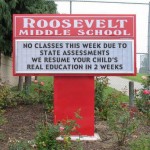 When anyone thinks of the job of a high school principal one may think of one who’s always in the patrolling the school’s hallway to catch students misbehaving, congratulating student athletes or assisting a teacher with a difficult students. We watch these images of administrators are all over classic movies such as cult classic, Ferris Bueller’s Day Off or Lean On Me. In those movies we watched school administrators not only seek out students who skipped school but helped kids who faced very difficult life situations while attending school. After leaving the movies you wanted to be like Principal Joe Clark and rescue kids from gangs and unengaged parents and you laughed when you thought of Principal Ed Rooney who went through hell just to catch a student skipping school. Not only did you feel good but you wanted your child to attend a school that had a school administrator that knew the pulse of their school better than anyone else.
When anyone thinks of the job of a high school principal one may think of one who’s always in the patrolling the school’s hallway to catch students misbehaving, congratulating student athletes or assisting a teacher with a difficult students. We watch these images of administrators are all over classic movies such as cult classic, Ferris Bueller’s Day Off or Lean On Me. In those movies we watched school administrators not only seek out students who skipped school but helped kids who faced very difficult life situations while attending school. After leaving the movies you wanted to be like Principal Joe Clark and rescue kids from gangs and unengaged parents and you laughed when you thought of Principal Ed Rooney who went through hell just to catch a student skipping school. Not only did you feel good but you wanted your child to attend a school that had a school administrator that knew the pulse of their school better than anyone else.
However, in 2013 many school administrators are forced to stay out of their school hallways and are held hostage in their offices trying to “crunch data” to make sure they are meeting all the mandates of education reform initiatives No Child Left Behind or Race to the Top. Before long not only are administrators not in the hallways but are only able to come into classrooms to observe teachers for evaluations or to deliver bad news which ultimately leaves some principals and other district level administrators totally clueless about the needs of a teacher, classroom or even a child in their own schools!
To make matters worse, these same individuals make decisions that affect every stakeholder in the district.
I saw this first hand when I was asked to sit on a committee about school reform. As many district and school level administrators gave their opinions on what needed to happen to change schools,I thought how disconnected they really were to what was happening in schools in 2013. They knew data but they rarely knew the stories behind the data. When the time came for me to give my opinion I simply stated, “In order to improve schools district and school level administrators have to actually visit the schools and be in the classroom.” When I said this the room went quiet and after a 15 second pause, the moderator said he wholeheartedly agreed and then passed the microphone to the next person. You see in public education the trend has been to rely less on the opinions of people on the front lines (such as teachers) and instead let people who have no real contact with children make all the decisions.
As I later discussed this issue with some professionals in Corporate America, I realized that my idea wasn’t rocket science and that several businesses around the Globe currently use this idea. Think of the television show, Undercover Boss and how much the boss finds out by just connecting with the employees that really run the business. There are also major corporations who encourage all employees at their headquarters to work one day a year in the retail store. This practice ensures that the decision makers will not lose touch of the real stakeholders, the customers. So what would happen if public education required school and district level administrators to take one day a school year and teach a class and/or shadow a teacher?
Quite simply, all hell would break lose. Not because these administrators couldn’t do it, but because for once all the policies and mandates that are proposed would finally have a human face. Mandating that all district level administrators re-enter the classroom would:
1. Give a real glimpse of the issues many schools face. So many times people in higher positions make decisions but don’t really know how it can affect the classroom. They speculate and have a lot of discussions but many times to realize the impact policies have they must be exposed to the classroom. For example,a new cell phone policy was being debated in a district I worked for that would allow kids to have phones and for them to be able to use them during lunch. Teachers were rightfully enraged at this idea because it was going to give them one more thing to battle in the classroom. Instead of passing the policy by debating it with the School Board, have a district level administrator experience the distraction cell phones can be in the classroom. After a class period of students texting while you’re talking or filming obscene behavior that cell phone policy would surely be tabled to a later date.
2. It would ensure that all levels of administrators remember who they are really there for, the kids. The point of any school in any community is to educate our most vulnerable citizens, our children. There’s really no quicker way to humble anyone then to put them in front of constituents who could care less about political agendas. Allow the kids to voice their concerns and to ask those hard to answer questions. We all know there will always be that child that bluntly asks what everyone wants to know like, “Why doesn’t my school have new playground equipment?”
3. It would give the experts,teachers, the ability to have frank conversations with people that make decisions about what they do in the classroom. How many times have we as teachers thought if they can just talk to the person who made the horrible decision to cut recess in half to prepare for state exams or worse thought to take away a critical reading program? Making administrators go into the schools would force them to answer tough questions from the real experts that otherwise they’d never have to discuss unless it was at a highly structured school board meeting.
In the end, if you want to make more administrators (both school and district level) accountable, put them in the classroom and close the door. Once they emerged I guarantee they’d think twice about passing a policy or creating an initiative that affects stakeholders negatively!






I think this is an excellent, doable idea. I also think that experienced teachers could happily pick up some administrative duties, especially if extra pay could be involved.
Great piece! One of my pledges this year, as a new administrator, is to visit ALL classrooms (not just the teachers I am assigned to formally observe) to get a pulse of the school’s instructional prowess. Because I believe (and I have been the benefactor of the reality) that “great leaders create great leaders,” I want to not only support, but build teacher capacity. This means I MUST be on the front lines with them, actively listening and providing feedback that will improve their practices. Thanks for sharing, Fran!